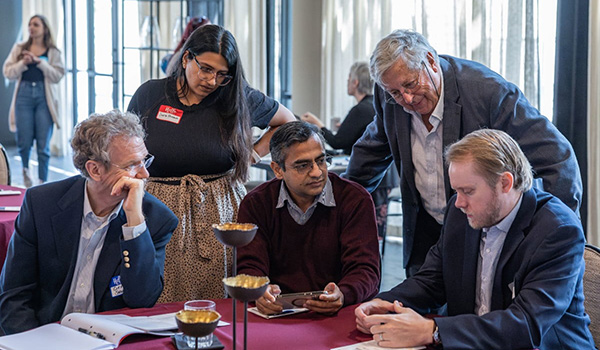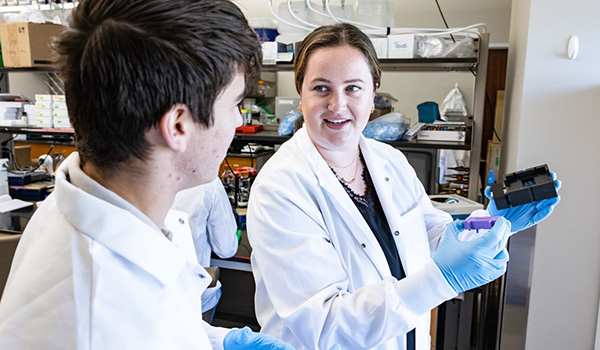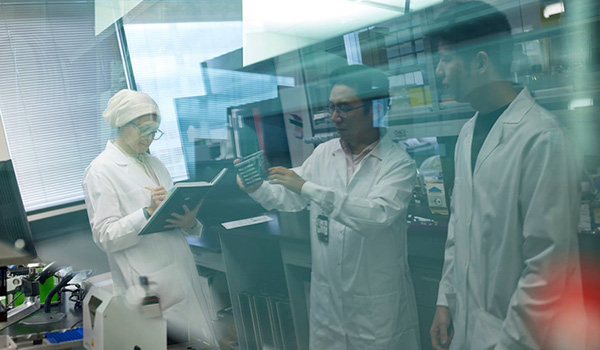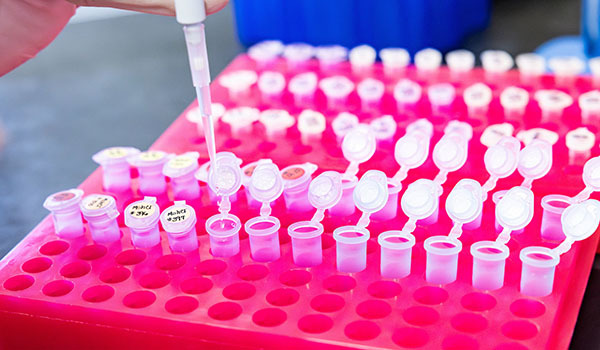Center of Excellence in Cancer Research
Welcome to the Texas A&M Center of Excellence in Cancer Research website!
I am Ken Ramos, MD, PhD, PharmB, Director of the Texas A&M Regional Center of Excellence in Cancer Research (TREC). Established in 2022, our Center supports a broad range of innovative cancer research initiatives across the Texas A&M University ecosystem, with a particular focus on the study of gene-environment-lifestyle interactions in cancer.
With financial support from the Cancer Prevention & Research Institute of Texas (CPRIT), the Texas A&M Center of Excellence fosters the development of early-career investigators in cancer research, attracts outstanding cancer researchers to Texas A&M University, and fosters an interactive environment that promotes productive research collaborations. Our collective goal is to incentivize the development of cancer research programs with national and international impact.
The Center draws on the expertise of investigators from various academic units across Texas A&M University to study how biological and genetic factors are influenced by environmental and lifestyle factors to define cancer risk. We aim to use this knowledge to enhance precision in cancer prevention, treatment, and healthcare delivery. The Core Components of the Center include services in the areas of single cell data analyses, clinicogenomics registry and biobanking, administrative functions, and evaluation.
I am excited to lead the TREC initiative as the Center continues to build cancer research at Texas A&M University, foster collaborations within and beyond the institution, and support cutting-edge cancer research aimed at improving prevention and finding cures for these devastating diseases.
I encourage you to explore the resources offered by the Center and to discover the outstanding quality of our programs.
Kenneth Ramos, MD, PhD, is Professor of Translational Medical Sciences, Alkek Chair of Medical Genetics, Executive Director of the Institute of Biosciences and Technology, Associate Vice President for Research, and Assistant Vice Chancellor for Health Services for the Texas A&M University System. He is an accomplished physician-scientist with designations in the National Academy of Medicine and National Academy of Sciences. He is a transformational leader recognized throughout the world for his scientific contributions in the areas of genomics, precision medicine and toxicology. With formal training in pharmaceutical sciences, chemistry, biochemistry, pharmacology, and medicine, Dr. Ramos is helping to steer the changing landscape of medicine, biotechnology, and healthcare. In this context, he leads several translational, clinical research, and educational programs that integrate diverse approaches to elucidate genomic mechanisms of disease and to develop novel therapies for several oncologic, pulmonary, and vascular diseases. Dr. Ramos has provided academic, executive, administrative, and scientific leadership in the areas of genetics and genomic medicine and toxicology at various academic institutions and over the course of his career has positively influenced the career of numerous clinicians and scientists engaged in medical, veterinary, and pharmaceutical practice. He is deeply committed to initiatives that advance modern technological applications to improve quality of healthcare and reduce disease burden and health-associated costs.

Kenneth S. Ramos, MD, PhD
Building a Force Against Cancer

Empowering Convergence
We are building a critical mass of researchers in Texas dedicated to curing cancer. The Regional Center of Excellence in Cancer Research was created to bring together the outstanding cancer research taking place across Texas A&M University to create a powerful collaborative environment that fuels innovation and accelerates breakthroughs that make a difference in the lives of Texas, and beyond.

Collaborative Innovation
To foster a highly interactive environment, we encourage cancer researchers from different disciplines to come together, share their knowledge, and generate new ideas. We incentivize researchers to pursue innovative and transformative cancer research programs to increase precision in cancer prevention and health-care delivery.

Nurturing Excellence
One of our core focuses is mentoring early career investigators who are interested in cancer research. By empowering and supporting these emerging researchers, we aim to foster a culture of innovation and ensure a sustainable pipeline of talent dedicated to curing cancer. In addition to mentoring, we are actively recruiting outstanding cancer researchers to join forces with us.
Upcoming Events
Cores
Four Core Services Support State-of-the-Art Cancer Research.

Single Cell Data Science Core
Overview
Single cell technologies such as single-cell RNA-seq (scRNA-seq) are rapidly revolutionizing a wide range of biomedical research. These cutting-edge methods enable researchers to analyze the gene expression of individual cells, offering unprecedented insights into cellular heterogeneity, developmental biology, and disease mechanisms. By providing a more granular view of biological systems, single-cell technologies have become essential in unraveling complex tissue environments, identifying rare cell populations, and understanding the molecular underpinnings of cancer, immune disorders, and other diseases.
Goals
We are developing novel statistical methods that address the challenges in:
- Finding new cell types.
- Characterizing cellular dynamics.
- Discovering gene regulations at the single-cell level.
- Monitoring structural, functional, or phenotypic changes under different experimental conditions.
- Relating rare transitional cells or cell phenotypes to disease progression.

Administrative Core
Overview
The Administrative Core supports all center activities to create a sustainable and successful center of excellence in cancer research.
Goals
- Establish a sustainable center of excellence in cancer research through professional development of the next generation of early career investigators at Texas A&M University who are successful in securing extramural funding to advance cancer research.
- Strengthen multi-disciplinary cancer research teams focusing on gene-environment-lifestyle interactions that foster a rich environment for career development of early career investigators.
- Organize resources around a central goal to support innovative cancer research projects addressing issues of relevance to Texans, the nation, and the world.
- Recruit talented investigators to Texas A&M University, with an emphasis on individuals traditionally underrepresented in cancer research.
- Create a career development and mentoring program that supports center faculty and their ability to climb the academic ladder, establish innovative research programs, and successfully compete at the national level.
- Support established investigators in their efforts to refocus their scholarly activities to address research questions in areas relevant to cancer, especially efforts focused on the central theme of the program.
- Establish core services that support state-of-the art cancer research.

Clinicogenomics Core
Overview
Typical registries and biobanks do not currently serve the needs of Cancer Interception and Precision Prevention programs, thus limiting hypothesis generation and the study of disease trajectories. We posit that a more complete understanding of cancer development, and the validation of strategies that prevent cancer in at-risk populations, would be aided by use of the Framingham approach that takes advantage of digital tools available today to contextualize social and economic disparities.
Goals
- Document the social, environmental, occupational and genetic determinants of cancer risk in the journey of patient’s receiving screening for cancer.
- Provide resources for cancer biomarker validation and hypothesis development.
- Enable implementation science around patient centric digital data governance models to empower longitudinal patient engagement.

Evaluation and Quality Improvement Core
Overview
The Evaluation and Quality Improvement core is tasked with establishing continuous quality improvement processes and outcomes for the Regional Center of Excellence in Cancer Research.
Goals
- The functioning of the center as a whole with all of its component parts.
- The monitoring of the center mentorship program goals and objectives.